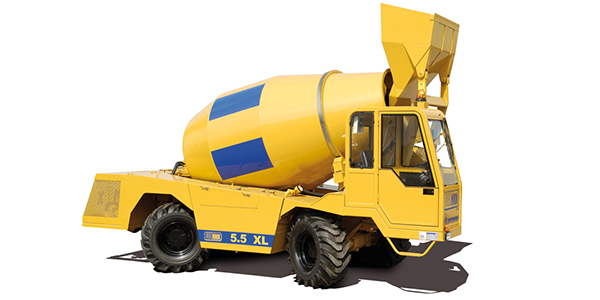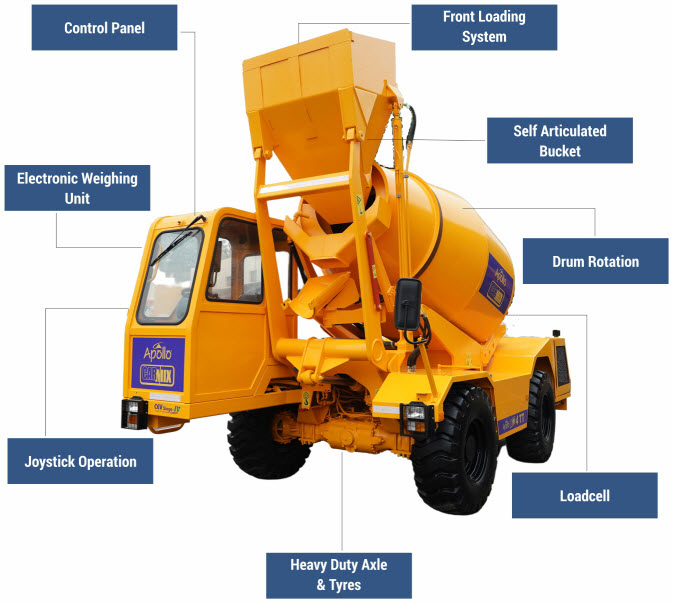
Introduction
Self-loading concrete mixers are an innovative solution designed to streamline the concrete production process. These unique machines integrate the functions of batching, mixing, and transporting concrete into a single unit, significantly reducing labor and time on construction sites. This article delves into the operation, advantages, and various applications of self- loading concrete mixers, highlighting their importance in modern construction projects.

How Self-Loading Concrete Mixers Work
Design and Functionality
Self-loading concrete mixers feature a rotating drum mounted on a chassis equipped with an operator-driven cab. This design allows for the loading, mixing, and transporting of concrete by a single operator. The machine is fitted with a loading bucket that measures and introduces the necessary ingredients into the drum. These ingredients typically include cement, sand, stone aggregates, and water.
Mixing Process
The mixing process begins with the operator batching the required materials into the drum using the loading bucket. The drum can be a reversible type, tilt type, or a combination of both, facilitating efficient mixing. A predetermined volume of water is added to the mixture via a water dispensing unit. The drum rotates at specific speeds to ensure thorough mixing of the concrete. Once the mixture is ready, it is discharged through a fitted chute.
Advantages of Self-Loading Concrete Mixers
Labor and Time Efficiency
One of the most significant advantages of self-loading concrete mixers is their ability to drastically reduce labor and time. A single operator can handle the entire process of loading, mixing, and transporting concrete, which traditionally would require multiple workers and equipment. This efficiency not only saves time but also reduces labor costs.
On-Site Concrete Production
Self-loading concrete mixers are particularly beneficial for on-site concrete production. They allow for the production of fresh concrete directly at the construction site, ensuring better quality and reducing the risk of concrete setting during transport. This capability is especially useful in remote locations where access to concrete batching plants is limited.
Flexibility and Mobility
The compact and mobile design of self-loading concrete mixers makes them highly versatile. They can easily navigate through rough terrains and tight spaces, making them ideal for urban construction sites as well as rural and remote areas. Their mobility allows for quick and efficient concrete production and placement, enhancing overall project productivity.
Cost-Effectiveness
Self-loading concrete mixers are versatile machines suitable for both urban and rural construction projects. In urban areas, their compact size and maneuverability enable them to operate in restricted spaces and underfoot conditions that are unsuitable for larger concrete transit mixer trucks. In rural areas, they provide an efficient solution for producing concrete on-site without the need for extensive infrastructure.
Applications of Self-Loading Concrete Mixers
Urban and Rural Construction
Self-loading concrete mixers are versatile machines suitable for both urban and rural construction projects. In urban areas, their compact size and maneuverability enable them to operate in restricted spaces and underfoot conditions that are unsuitable for larger concrete transit mixer trucks. In rural areas, they provide an efficient solution for producing concrete on-site without the need for extensive infrastructure.
Concrete Pavement Maintenance
These mixers are ideal for concrete pavement maintenance, offering a quick and efficient method for repairing damaged sections of pavements. Their ability to produce fresh concrete on-site ensures high-quality repairs, reducing downtime and extending the lifespan of the pavement.
Bridge and Tunnel Construction
Bridge and tunnel construction often involves working in confined and challenging environments. Self-loading concrete mixers, with their flexibility and precision, are well- suited for these projects. They can deliver accurate amounts of concrete to specific locations, ensuring the structural integrity of the construction.
Township-Level Highways Construction
For township-level highway construction, self-loading concrete mixers provide a reliable and efficient means of producing and placing concrete. Their ability to operate independently ensures a steady supply of concrete for highway construction projects, enhancing project efficiency and quality.
Foundation Construction
In foundation construction, the quality and freshness of concrete are crucial. Self-loading concrete mixers ensure that the concrete used for foundations is produced on-site, maintaining its quality and contributing to the stability and durability of the structure.
National Defense Facilities
Construction projects for national defense facilities require high security and efficiency. Self- loading concrete mixers can operate in secure areas, producing concrete on demand and ensuring that construction timelines are met without compromising security.
High-Speed Railway Construction
High-speed railway construction demands precise and high-quality concrete placement. Self- loading concrete mixers provide the accuracy and efficiency required for such projects, ensuring that the concrete meets the stringent standards necessary for high-speed railway infrastructure.
Conclusion
Self-loading concrete mixers are a versatile and efficient solution for various construction scenarios, offering significant advantages in terms of labor and time efficiency, cost- effectiveness, flexibility, and mobility. Their ability to produce fresh concrete on-site makes them an invaluable asset for urban and rural construction, pavement maintenance, bridge and tunnel projects, highway construction, foundation building, national defense facilities, and high-speed railway construction. Understanding their operation and benefits can help construction professionals leverage these machines for optimal project performance and success.
FAQs About Self-Loading Concrete Mixers
A self-loading concrete mixer is a machine that combines the functions of a concrete mixer truck, loader, and batching plant. It allows a single operator to load, mix, transport, and discharge concrete independently.
The machine features a rotating drum mounted on an operator-driven chassis. The operator batches and loads the necessary materials (cement, sand, aggregates, water) into the drum using a loading bucket. The drum mixes the concrete, which is then discharged through a chute.
Benefits include significant labor and time savings, on-site concrete production, flexibility and mobility, cost-effectiveness, and the ability to produce high-quality concrete directly at the construction site.
They can be used in urban and rural construction, concrete pavement maintenance, bridge and tunnel construction, township-level highways, foundation construction, national defense facilities, and high-speed railway construction.
Their robust design and mobility allow them to navigate through rough terrains and tight spaces, making them suitable for various construction environments, including those with difficult underfoot conditions.
Yes, their compact size and excellent maneuverability make them ideal for operating in confined and restricted spaces, such as urban construction sites.
By understanding the versatility and efficiency of self-loading concrete mixers, construction professionals can enhance their project performance and ensure the successful completion of various construction tasks.
Recent Articles
- Market Growth and Future Trends in Self-Loading Concrete Mixers for the Construction Industry
- How Self-Loading Concrete Mixers Reduce Labour Costs and Increase Productivity?
- Comparing Self-Loading Concrete Mixers vs. Traditional Concrete Mixing Methods
- The Role of Self-Loading Concrete Mixers in Modern Construction
- Self-Loading Concrete Mixer Machines for Infrastructure Development Projects
Copyright © 2025, Apollo Carmix Equipments Private Limited (ACEPL), All rights are reserved.
Web Design & SEO by Webmasterindia

